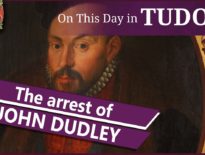On this day in Tudor history, 22nd July 1576, in the reign of Queen Elizabeth I, playwright and pamphleteer, Edward Sharpham, was baptised at Colehanger, East Allington, in Devon. Sharpham is thought to have written the plays “The Fleire” and “Cupid's Whirligig”, and fellow playwright Ben Jonson referred to him as a rogue.
Find out more about this lesser-known Tudor man and his comedy Cupid's Whirligig in today's talk.
Cupid’s Whirligig can be read at https://books.google.co.uk/books?id=k15iAAAAcAAJ&pg=PT6&source=gbs_toc_r&cad=4#v=onepage&q&f=false
Also on this day in Tudor history, 22nd July 1536, Henry VIII’s illegitimate son, Henry Fitzroy, died at St James’ Palace. It was a huge blow for the king. You can find out about Fitzroy’s illness, death and burial, and what a favourite he was with his father, in last year’s video:
Also on this day in history:
- 1437/8 – Birth of John Scrope, 5th Baron Scrope of Bolton, soldier and a Councillor of Richard III. He was imprisoned after supporting pretender Lambert Simnel in 1487, but was pardoned in 1488.
- 1549 – Robert Kett and protesters stormed Norwich and took the city, during Kett's Rebellion.
- 1581 – Death of Richard Cox, Bishop of Ely, at Downham in Cambridgeshire. He was buried in Ely Cathedral.
Transcript:
On this day in Tudor history, 22nd July 1576, in the reign of Queen Elizabeth I, playwright and pamphleteer, Edward Sharpham, was baptised at Colehanger, East Allington, in Devon. His birthdate is not known but babies were usually baptised within a few days of birth. Sharpham is thought to have written the plays “The Fleire” and “Cupid's Whirligig”.
Now, I’d never heard of Edward Sharpham and I just loved the title “Cupid’s Whirligig”, so I thought I’d research him a bit more. Let me tell you a bit about this little-known Tudor chap…
• Edward Sharpham was the third child of Richard Sharpham and his wife, Mary Pomeroy.
• Sadly, Sharpham’s father died when he was 5 years old and interestingly his mother sued a man named Thomas Fortescue for killing her husband by witchcraft and using witchcraft to make her fall in love with him. In 1596, twenty-year-old Sharpham also sued Fortescue and a man named William Bastard of the Middle Temple, one of the inns of the court, for tampering with evidence related to his mother’s lawsuit. Sharpham’s mother ended up remarrying, but not Fortescue, she married Alexander Hext, and had three children by him. After his death in 1588, she married Charles Barnaby.
• It is thought that Sharpham was educated at grammar school before being admitted to the Middle Temple in 1594.
• The 1597 “The Discoverie of the Knights of the Poste”, a pamphlet about the criminals that could be encountered on the road between Exeter and London, is attributed to ES, and is thought to have been by the 21-year-old Edward Sharpham. Another piece of writing by ES is a commendatory poem to the comedy Volpone by Ben Jonson. Other works that are attributed more certainly to Sharpham, include the 1607 “The Fleire”, which was written for the Children of the Blackfriars, a boys’ theatre company, and the 1607 “Cupid’s Whirligig”. The Fleire is a satire of King James I’s court and Cupid’s Whirligig is a comedy set in London about a man who suspects his wife of being unfaithful. According to the synopsis of the play, the man, Sir Troublesome comes up with plan upon plans to prove his wife is unfaithful, including the idea of castrating himself and seeing if his wife gets pregnant. Lady Troublesome comments in the play, “tis such a jealous fool, that if he catch but a Flea in her bed, he will be searching to see if it bee a male or a female, for fear a comes to Cuckold him”. Oh dear. The play was performed by the Children of the King’s Revels in the Whitefriars Theatre in 1607. I’ll give you a link to read the play for yourself.
• In 1608, when he was 31 years old, Sharpham fell ill with the plague. He wrote his will on 22nd April 1608 and was buried on 23rd April 1608 at St Margaret’s Church, Westminster.
• Trivia: Playwright Ben Jonson referred to Sharpham as “a rogue”, along with playwright John Day and author Thomas Dekker.



Leave a Reply